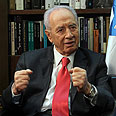
Peres: Talks with Hamas possible
In special Independence Day interview, president says peace with Palestinians can be reached through covert talks, without Oslo 'everyone would be Hamas,' and Jerusalem housing should be built upwards - not in east Jerusalem
According to Peres, nothing is set in stone. "Even when I began negotiation with Arafat, they said, 'there's no chance,'" he says. "I think the same thing about Hamas. The name does not interest me, what matters is the content. Anything can happen, because Hamas has problems too, and it's not so strong."
However, if Hamas does not change its positions, Peres adds, it might face economic sanctions. He rejects the international community's criticism of Israel's reaction to the Palestinian reconciliation, explaining that the unity agreement has implications for Israel's security.
"If they want to unite, let them unite," he says. "We are discussing our own security issues, and if they establish a union with an organization that continues to espouse the destruction of Israel, it's no longer an interior affair, it's a foreign affair, and it concerns us."
Negotiations, away from public eye
Regardless of the worrying developments on the Palestinian front, Peres advocates for the commencement of covert negotiations between Israel and the Palestinian Authority, away from the eye of the media. "We should try to reach an understanding with the Palestinians, and I stress the word 'quietly.' Publicly, there's no chance."
Peres, who has ample experience with peace talks, explains that negotiations always start with extreme demands.
"Each side wants to prove to his people that he is strong, aggressive, that he does not give up, but the leaders know in their hearts that there's no choice, and that peace must be reached," he says. "No one wants to return to the bloodshed… This why we have to differentiate between outward appearances and the hidden potential."

Peres: Anything is possible (Photo: Gil Yohanan)
And Peres is certain that it is possible to agree - even on explosive topics like the refugee issue. "It is clear to the Palestinians that we will not accept their right of return under any circumstances, and that it would be Israel's suicide," he says. "Now comes the question of how to express this. Sometimes generous wording spares us generosity with lands. We are stingy with words."
On Oslo
The president is aware of the criticism directed at him for the Oslo Accords, which he signed in the early '90s and for which he received a Nobel Peace Prize, with then-Prime Minister Yitzhak Rabin and then-Palestinian leader Yasser Arafat. But Peres finds encouragement in the belief that if it wasn't for Oslo, "Everyone would be Hamas."
"The fact that there are two groups within the Palestinian people, one that wants to negotiate and another that uses terror – this is a result of the Oslo Accords," he explains.
You won't hear a word of public criticism of Prime Minister Benjamin Netanyahu come out of the president's mouth. Over the two years that have passed since the establishment of Netanyahu's second administration, Peres has refused to openly disapprove of the policies that have lead to a political stalemate, contributed to Israel's growing isolation from the international community and driven the Palestinians to pursue United Nations recognition of an independent state.
Netanyahu's efforts to cultivate his relationship with Peres, by updating him and sharing his top secrets, are apparently paying off.
"What I have to say, any criticism or disagreement, I don't say in public," Peres explains.
Peres says that he is not familiar with the content of the speech Netanyahu is expected to make later this month in the United States.
"I am not sure whether such a speech exists yet," he says. "I also think that such a speech must be influenced from the coming developments. If he made the speech a month ago, it would have been one speech, and today it would have been a different one."
'Sonya lives in my heart'
The said developments, naturally, will have implications for the borders between Israel and the Palestinian Authority, and especially for the pace of the construction in the settlements. The president's position on the expansion of Jewish neighborhoods in east Jerusalem is quite clear.
"Over the past 40 years, no Israeli administration has built in the 21 Arab suburbs in east Jerusalem, and I don't see a need to change that."
As for the claim that Jerusalem needs to be expanded, Peres says that the capital should be built upwards. "You can sometimes house 10,000 people in one tower," he says. "Today the whole world is building vertically, thus leaving space for green areas."
On a more personal note, Peres defends his decision not expose the reports that he received about the misdeeds of his predecessor, former President Moshe Katsav – by saying that gossip is not in his job description.
"I am not a prosecutor, not the police and not a court," Peres says. "Since I was the victim of so many stories, and so many people invested energy to prove stories that are false, I didn't want to deal with it."
Peres insists that the presidency was not damaged by the Katsav debacle. "The presidency wasn't accused of anything," he says. "A person who served in the role of the president was accused as a person, not because of the institution."
Four months ago the president's wife, Sonya Peres, passed away. "She lives in my heart," he says about life without her. "Death is physical, but the love doesn't die. I don't only miss her, I am also proud. For 70 years I had a wife that I not only loved, but appreciated greatly. She had wisdom, she was a brave woman, just and loving. Of course I miss her."
Attila Somfalvi contributed to this report
- Follow Ynetnews on Facebook










